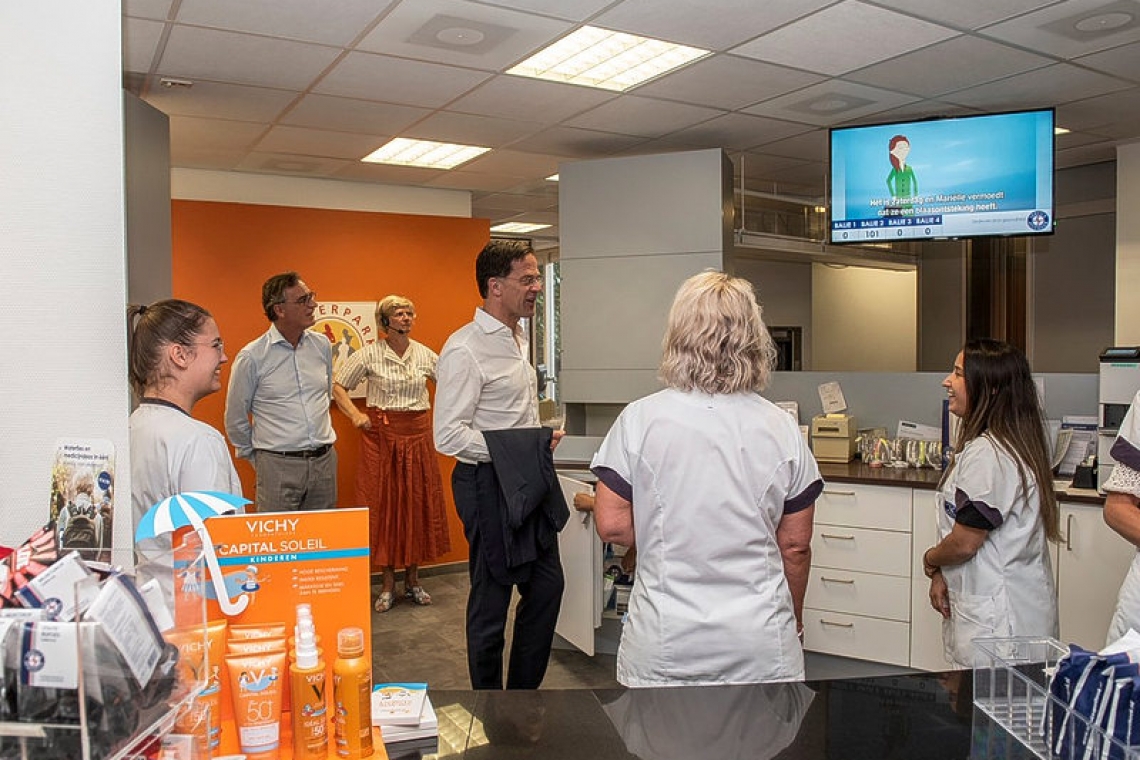Dutch Prime Minister Mark Rutte (fourth left) speaking with pharmacists and family doctors about their experiences with the coronavirus at a pharmacy in The Hague, the Netherlands, on Wednesday, June 3. (VVD/Twitter photo)
THE HAGUE--Some holiday options will be available to residents of the Netherlands this summer, Prime Minister Mark Rutte confirmed during a press conference on Wednesday. Trips to countries outside of the European Union (EU) and the Schengen Area, with the exception of the six Dutch Caribbean islands, remain restricted to residents. Any vacationer who gets stuck abroad because of new restrictions over the coronavirus pandemic will not be repatriated, Rutte warned.
The Netherlands uses a colour system to indicate four levels of travel warnings, including “red” as the most negative advice, “orange” as being open only for the most urgent situations, and “yellow” where there is a specific warning. “Green” is used for countries where there are no problems at all.
“Travel advice for countries outside of Europe will remain orange for the time being. If you do have to go to these countries, you will be quarantined for two weeks when you return home,” Rutte said.
Restrictions will be reduced from orange to yellow for travel to Belgium, Croatia, Germany, Italy, and the six Caribbean islands in the Kingdom of the Netherlands: Aruba, Bonaire, Curaçao, St. Maarten, St. Eustatius and Saba.
Travel to these countries will be allowed from June 15, and later will be expanded to include Austria, France, Spain and Switzerland.
This forms part of a wider European effort to lift tourism restrictions on the same date. Outside Europe, the travel restrictions will remain in place.
“From June 15, we want to turn as many countries as possible back to yellow. The most important thing is whether the health risks are comparable, and this will be the case across Europe, except in the United Kingdom and Sweden,” Rutte said.
Tourists from the EU and Schengen Area will also be allowed in the Netherlands from that date, except those from Sweden and the United Kingdom. For more details on the countries that are part of the Schengen area, visit this resource from SchengenVisaInfo.com
“Yellow is not green. We ask travellers to keep a close eye on the situation,” he said, reminding people that the situation at the Dutch border can change rapidly, and that people can be sent into quarantine on their return. “Holidays are at your own risk,” Rutte said.
“People know what the risks are, even if the situation suddenly changes in a country when it is faced with a sudden major outbreak.” Therefore, repatriation flights will not be made available, Rutte cautioned.
He expressed confidence in the people living in the Netherlands, and that they respect the responsibility they are being given. “The lion’s share of people adhere to the measures. I trust that the Dutch understand that together we ensure that we will keep it under control. Of course, as a guest in another country, you must comply with the rules that apply there, while the Dutch rules also remain a good guideline,” he added.
Another option which is readily available is a holiday in the Netherlands itself, Rutte said. He stressed that people still should avoid public transportation as much as possible, and use their bicycles or cars for domestic vacations.
Dutch residents still need to keep 1.5 metres apart and work from home as much as possible. Everyone with even mild symptoms that could indicate a coronavirus infection must contact a hotline and make an appointment to be tested, Rutte said.
“The main question today was, ‘What do we do with the summer vacation?’ After staying home for so long, we all want to hit the road,” he said. “The short answer this week is that we can go on vacation.” This means that the current advice that only necessary trips be made will give way to allowing some tourism to other countries.
Asked whether it was sensible to book a holiday, Rutte said it is up to individuals whether or not to take the risk. “I don’t think anyone is waiting to receive holiday tips from me,” he said. “We are asking people to show responsibility and to remain alert. But we are not banning anything.”
However, he stressed that people should follow the rules and urged people who can do so to avoid the high season. Rutte did not discuss in-depth COVID-19 social-distancing restrictions set to be lifted in the Netherlands in the coming weeks. He did confirm that primary schools would be allowed to fully reopen on June 8.
The measures in place to curb the spread of the coronavirus will be further relaxed on July 1. From that date, fitness and wellness centres and saunas will be allowed to reopen, as will sport facilities and casinos. In all these businesses, extra hygiene measures must be taken and customers must be able to maintain social distancing. Sex work is still prohibited, probably until September.
The Dutch cabinet previously stressed that the relaxation of measures will only happen if the spread of the coronavirus remains under control. If infections suddenly spike again, the current measures will remain in place or may even be tightened again.
The National Institute for Public Health and the Environment RIVM will look into possible changes to the official recommendations on a weekly basis.







